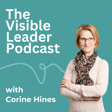
The Power of Weekly (Yes Weekly!) 1-2-1s : Dr Steven Rogelberg Shares Research-Backed Strategies
Dr. Steven Rogelberg is an organizational psychologist whose award-winning research into meetings led to the publication of the highly successful book The Surprising Science of Meetings.
And again, he’s taken that research-based approach with his latest book – the excellent Glad We Met: The Art and Science of 1:1 meetings.
In this episode we challenge the idea that 1:1s are an optional extra for team members who ‘need’ them - and offer a framework for how to get started.
We talk about:
- What the research says and why 121s matter to your team members
- Whether you can be too senior to need a 121.
- What leaders are getting wrong.
- The mechanics of what a good 121 should look like.
- How to get started for leaders and for HR
You can find resources on Dr. Steven Rogelberg’s website: www.stevenrogelberg.com
And find his book here: Glad We Met: The Art and Science of 1:1 Meetings
Click here to get your free copy of my Leader's Guide to Increasing Your Impact, Influence & Free Time [www.visibly-different.co.uk/increasing-your-impact]
And if you enjoyed the Podcast, please share with someone who might benefit and leave a rating and review.
